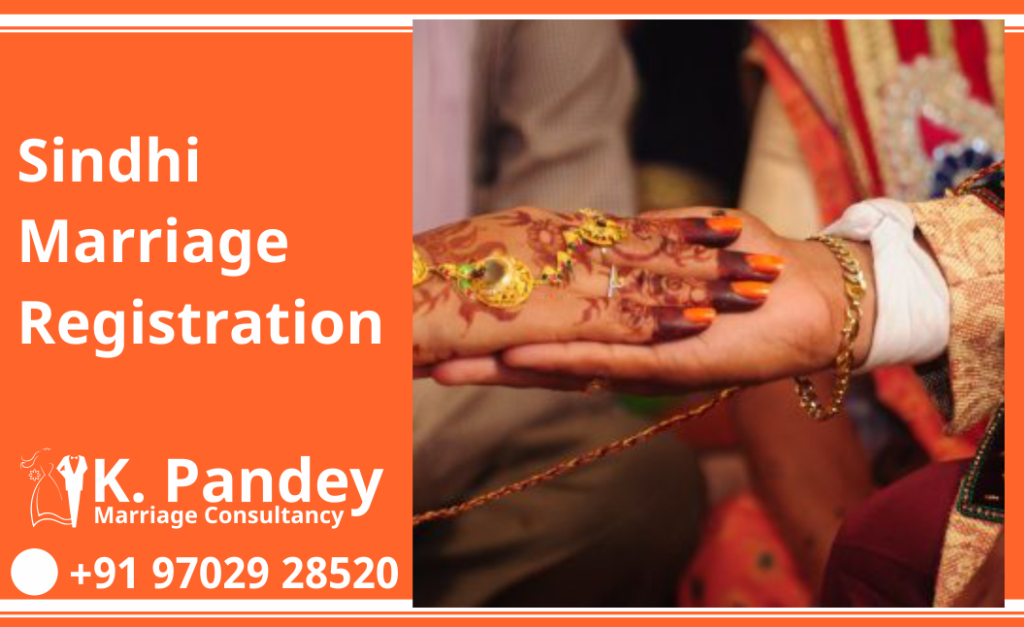Sindhi Marriage Registration in Mumbai

Sindhi Marriage Registration in Mumbai under Special Marriage Act 1954 provides individuals from Sindhi communities with an official means to legally register their wedding in India. Moreover, the Special Marriage Act of 1954 establishes a legal basis in India that permits people of various faiths, backgrounds, or religions to legally marry one another. This Act offers an alternative to religious wedding ceremonies while still uniting couples, regardless of any differences related to religion or culture. Here are some key features of the Special Marriage Act 1954:
- Interfaith Marriages: The Act allows individuals of diverse religious backgrounds – or those belonging to one and having different interpretations – to marry without requiring religious conversion, thereby encouraging secular marriages.
- Legal Recognition: Marriages registered under this Act enjoy legal recognition across India, which can greatly assist with matters such as inheritance, visa applications, and other important legal matters.
- Religious Ceremonies: In contrast to religious ceremonies that often involve specific rituals and religious leaders, marriages under this Act typically take place at the office of a marriage registrar and focus more on the legal aspects rather than the ceremonial aspects.
- Notice of Intended Marriage: Couples planning to marry under this Act must notify the marriage registrar of their intention at least 24 hours before making it public, allowing for any possible objections from third parties.
- Registration Ceremony: Following the expiration of the notice period and in the absence of valid objections, a simple registration ceremony takes place at the Registrar’s Office, where couples sign their marriage register in the presence of witnesses.
- Benefits: Marriages under this Act offer numerous advantages, including the ability to retain one’s religion of choice, access legal rights and obligations associated with spouses, and gain social acceptance.
- Divorce under the Act: Should any issues or disputes arise within the marriage, this Act outlines a process for dissolution.
- Witnesses and Affidavits: Witnesses are necessary for registration ceremonies and consent forms submitted prior to marriage registration. Additionally, affidavits may need to be provided to verify the eligibility and consent of couples seeking to marry each other.
In summary, the Special Marriage Act of 1954 provides a legal and secular avenue for couples seeking to marry outside of religious traditions or different faiths. This Act offers legal protection and secular options when planning a marriage in India.
How to apply for Sindhi Marriage Registration in Mumbai?
Step 1: Apply for a Notice of Intended Marriage
Firstly, you and your partner need to fill out the necessary paperwork to inform the government of your intention to get married. This paperwork serves as a notice stating your desire to enter into marriage. Subsequently, you will be required to submit this notice to the marriage registrar in your locality.
Step 2: Get the Notice of Intended Marriage published
Following the submission of your notice, the government will proceed to make it publicly available. It will be displayed in a visible location, much like posting a notice on a bulletin board. This step ensures that others are aware of your impending marriage, providing them with an opportunity to raise any objections, if necessary.
Step 3: Attend the Marriage Registration Ceremony
Once the notice has been publicly displayed for the specified duration, typically around 30 days, and no valid objections have been raised, you and your partner will attend the marriage registrar’s office. Here, you will partake in a simple ceremony to formalize your marriage. It is akin to exchanging vows, but with a legal aspect.
Step 4: Obtain the Marriage Certificate
Following the ceremony, you will be issued a marriage certificate, which serves as an official document proving your marital status. This certificate holds significant importance for various legal matters and official documentations that require a change in your marital status.
Eligibility for the Sindhi Marriage Registration in Mumbai
The Special Marriage Act, 1954, is an Indian legislation that enables individuals of different religions, castes, or nationalities to marry each other. It establishes a legal framework for civil marriages in India. To get married under this act, certain eligibility criteria must be met:
Firstly, with regards to age, both parties should be at least 21 years old for males and 18 years old for females. However, it’s important to check the local regulations, as the legal age for marriage may vary slightly between states.
Secondly, both parties must be of sound mind and capable of giving valid consent to the marriage.
Thirdly, the act prohibits marriages between certain close relatives, as defined in the act. Therefore, parties should not be within the degrees of prohibited relationship as specified in Schedule I of the act.
Furthermore, at the time of marriage, both individuals must be unmarried, divorced, or widowed. In the case of a previously dissolved marriage, it is necessary to provide the divorce decree or death certificate of the former spouse as proof.
Additionally, parties intending to get married under the Special Marriage Act need to give notice in writing to the Marriage Officer of the district where at least one of them has resided for at least 30 days before the date of giving notice.
Moreover, after the notice is received, it is displayed on the notice board of the Marriage Officer for 30 days. During this period, any objections can be raised. If no objections are raised, the marriage can proceed.
Furthermore, during the marriage ceremony, both parties must declare that there is no lawful impediment to the marriage and sign a declaration in the presence of three witnesses.
Lastly, after the marriage ceremony, the Marriage Officer issues a marriage certificate, which legally validates the marriage.
By adhering to the provisions of the Special Marriage Act, individuals can enter into a lawful and recognized union, regardless of their religious, caste, or nationality differences.
Documents required for the bride and groom
Application Form: You need to complete and sign the application form for marriage registration. This form can be obtained from the local marriage registrar’s office.
Passport-sized Photographs: Both partners should provide passport-sized photographs.
Proof of Age and Identity: Each partner should provide one of the following documents as proof of age and identity:
- Birth certificate
- Passport
- Driving license
- PAN card
- School or college certificate
- Aadhar card
Residence Proof: You should provide a document to prove your residential address. This could be any of the following:
- Voter ID
- Aadhar card
- Passport
- Utility bills (like electricity or water bills)
Affidavit: A sworn affidavit stating that both partners are eligible for marriage under the Special Marriage Act and are not related within the prohibited degrees of relationships. This affidavit is typically on non-judicial stamp paper and signed by a notary.
Passport-sized Photographs of Witnesses: You’ll need two witnesses at the time of marriage registration, and they should provide passport-sized photographs and identification documents (like Aadhar card, passport, etc.).
Divorce Decree Absolute or Death Certificate (if applicable): If either of the partners has been previously married and is now divorced or widowed, the relevant documents, such as the divorce decree absolute or the death certificate of the former spouse, should be provided.
Documents required for three witnesses
To be a witness at a Sindhi Marriage Registration in Mumbai, you need these documents:
- Identity Proof: Use a government-issued ID like Aadhar card, passport, voter ID, or driver’s license to prove who you are.
- Residence Proof: Show something that proves where you live, like utility bills (electricity, water, gas) or a rental agreement.
- Passport-sized Photographs: You might have to give a few small photos of yourself.
- Age Proof: Sometimes, the Marriage Registrar might ask for proof of your age, like a birth certificate, school leaving certificate, or passport.
What are the benefits of getting married under the Special Marriage Act of 1954?
There are some important benefits to getting married under this Act:
- Freedom of Choice:You have the freedom to marry the person you love, even if they are from a different religion or background.
- Legal Recognition:Your marriage is legally recognized by the government, which means you get all the rights and responsibilities that come with marriage.
- Social Acceptance:This type of marriage is widely accepted in society, which can make your life easier in many ways.
- Inheritance Rights:You and your spouse have rights to each other’s property and assets.
- No Conversion:You don’t have to convert to another religion to get married; you can keep your own faith.
FAQ for you..!
FAQ for Sindhi Marriage Registration in Mumbai
What is the Special Marriage Act 1954?
The Special Marriage Act 1954 is a law in India that enables individuals from diverse backgrounds, religions, and communities, including Sindhis, to legally unite in matrimony.
Can Sindhis get married under the Special Marriage Act?
Absolutely! Sindhis have the option to solemnize their marriage under the provisions of the Special Marriage Act 1954. This act is inclusive and applies to individuals of all backgrounds.
How do we initiate the marriage registration process?
To commence the process, you need to submit a “Notice of Intended Marriage” to the local marriage registrar. This notice serves as an official declaration of your intention to marry.
What happens after we submit the Notice of Intended Marriage?
The notice is published for a specified period, typically around 30 days, to allow for any objections. If no valid objections are raised, you can proceed with the marriage ceremony.
Do we need to change our religion or convert to marry under this Act?
No, there is no requirement to change your religion or convert in order to marry under the Special Marriage Act. You can solemnize your marriage without altering your faith.
What is the marriage registration ceremony like?
The marriage registration ceremony is a straightforward and lawful event. It involves exchanging vows in the presence of a marriage registrar and signing the marriage register.
How long does the registration process usually take?
The duration of the registration process varies depending on local procedures and potential objections, typically taking a few weeks to a few months.
Do we need a lawyer to register our marriage under this Act?
While not mandatory, some individuals choose to engage a lawyer for legal guidance and assistance with the necessary paperwork.
Why should we consider getting married under the Special Marriage Act?
Opting for marriage under this Act ensures a legally recognized union, irrespective of your background, granting you access to the legal and social benefits associated with marriage.
What documents do we receive after the marriage registration?
Following the registration, you will be issued a marriage certificate. This certificate serves as official proof of your marriage and holds significance for various legal and administrative purposes.








Latest Blogs
